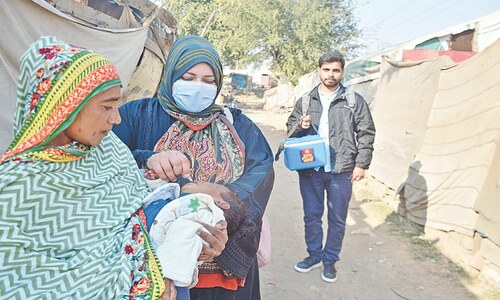WASHINGTON: If this is Thursday, it must be Ottawa for US President Barack Obama.
He travelled around the United States for most of two years to win the White House. Now that he has been living there for a month, he has caught the travel bug again.
Last week he campaigned for the $787 billion economic stimulus bill by travelling four days in a row, going to Indiana, Florida, Virginia and Illinois.
Then he spent a long holiday weekend in his hometown of Chicago and this week he has visited Denver, Colorado, and Phoenix and Mesa in Arizona.
On Thursday he went on his first foreign trip. In the Canadian capital, he talked trade with Canadian Prime Minister Stephen Harper and drew laughter by thanking those Canadians “who came over the border to campaign for me during the election.”“It was much appreciated. And I’m looking forward to coming back to Canada as soon as it warms up,” he said.
Obama, whose approval rating is more than 60 per cent, is drawing big crowds and revelling in the attention, with the cheering throngs a welcome change from Washington, where the next partisan battle is never far away.
It did not take long for Obama to complain about feeling constricted after he won the Nov 4 election, cut off from regular people by the massive security bubble that surrounds him wherever he goes.
“He believes there’s a lot of benefit to getting out of Washington at least once a week and meeting with and seeing the problems that Americans are dealing with,” said White House spokesman Robert Gibbs.
Direct to the public
White House veterans said travelling around the country allows the president to take his case to the people who elected him and escape Washington, which many Americans consider out of touch with their concerns.
“The White House can be a very confining place,” said Jeff Eller, who worked for former President Bill Clinton. “It’s always good to get out and literally see other parts of the country, touch people and listen to them.”
Back when he was a senator from Illinois, Obama could easily walk around his Chicago neighbourhood to get coffee or see friends. Now any such movement is a major production.
Harry Truman once referred to the White House as the “great white jail” – and indeed it can seem that way sometimes. The grounds of the mansion are surrounded by a tall security fence and the living quarters are mostly confined to two floors of the six-level complex.
“I think for any president, the first thing they regret is the loss of their common touch and the feel of losing that common touch with everyday Americans, so they’re always looking for ways to keep connected,” said Trent Duffy, who worked for President George W. Bush.
Obama fought and won a battle to hang on to his BlackBerry device to overcome layers of bureaucracy and stay in touch with top staff and a close coterie of friends.
He told CNBC in January he was looking for unscripted ways to interact with people – “ways that aren’t controlled, ways where, you know, people aren’t just complimenting you or standing up when you enter into a room, ways of staying grounded.”
Permanent campaign
By signing the economic stimulus bill in Denver, Obama was following a time-honoured tradition of presidents making news outside of the US capital. Appearances outside of Washington can get greater media attention, make the president seem above the political fray and allow him to push his message.
There may well be a political element to his travels.
Many of the states he has visited recently are ones that for years voted Republican in presidential elections but went for Obama the Democrat this time. He would certainly hope they go for him again, assuming he runs for re-election in 2012.
Presidential scholar Stephen Hess, a political science professor at George Washington University, said that “in a sense we are in the era of the permanent campaign.”
He said presidents can learn what is on the minds of people when they travel, such as when John F. Kennedy heard a roar of approval from a crowd when he talked up the possibility of a nuclear-test ban treaty.
“When you’re here in Washington, how do you get your information? You get it sort of tabulated for you. ‘Here’s what your pollsters are telling you,’” Hess said. “It’s only when you go out there when you can put some meat on these bones.” —Reuters












































Dear visitor, the comments section is undergoing an overhaul and will return soon.